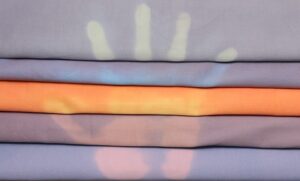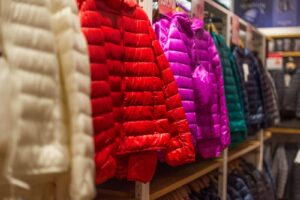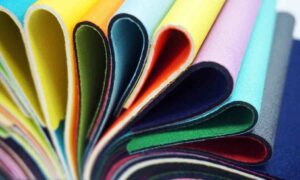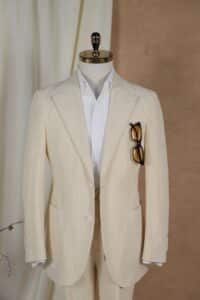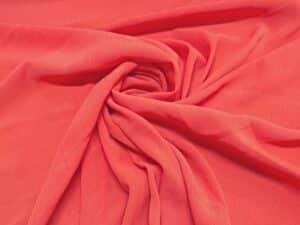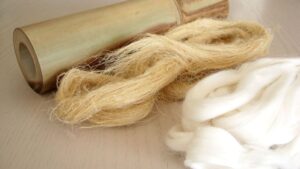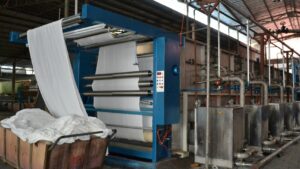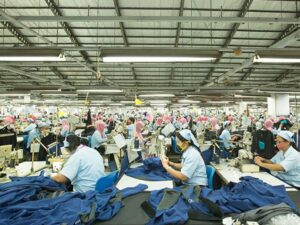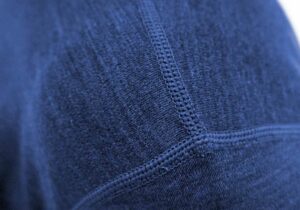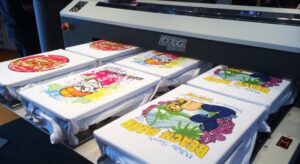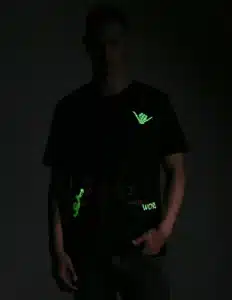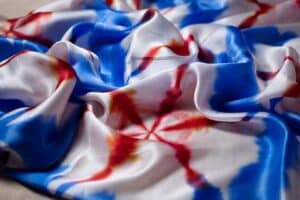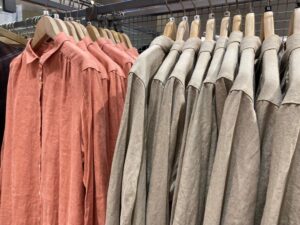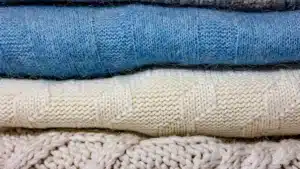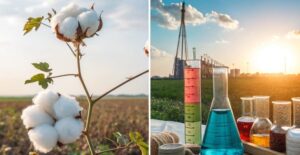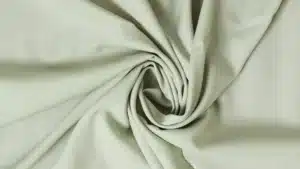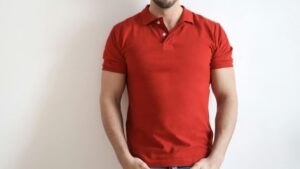
TENCEL™ is Lenzing's flagship brand for textile. TENCEL™ fibers are soft to the skin, smooth to the touch and luxurious in shine and flow.
The Chinese name of TENCEL brand is 天丝™ (tiān sī) which is the close transliteration of TENCEL and literally means Sky Silk.
Tencel fabric is a sustainable material made from wood pulp. It often comes from eucalyptus, beech, or spruce trees. Its production process reduces harm to the environment. This makes it an eco-friendly choice. Tencel is soft, breathable, and strong, unlike many fabrics. It is popular in clothing and home items for its comfort. If you care about the planet, Tencel is a great choice. It combines style with eco-friendly benefits.
Key Takeaways
Tencel fabric comes from wood pulp, mainly eucalyptus trees. It is eco-friendly and sustainable.
Its production reuses 99% of solvents, cutting waste and pollution.
Tencel feels soft, lets air through, and lasts long. It is great for clothes and home items, especially for sensitive skin.
Picking Tencel lowers trash in landfills. It breaks down naturally and does not hurt the planet.
Tencel needs much less water than cotton. It is a better choice for eco-friendly fashion.
What is Tencel Fabric?

How Tencel is Made
Tencel comes from wood pulp. This pulp is usually taken from eucalyptus trees. First, the wood pulp is broken down using a safe solvent. The mixture is turned into fibers, then washed and dried. This process is eco-friendly because it reuses the solvent. Recycling the solvent reduces waste and helps the environment.
The fibers made are soft, strong, and breathable. These features make Tencel great for clothes, bedding, and sportswear. The process keeps the fabric durable and gentle on skin. Choosing Tencel supports a green way of making fabric that values quality and nature.
Types of Tencel Fabric
There are two main kinds of Tencel fabric: Tencel Lyocell and Tencel Modal.
Each type has special features for different uses.
Type | Description | Performance Characteristics |
|---|---|---|
Tencel Lyocell | Made from eucalyptus wood with a safe solvent. | Soft, strong, breathable, keeps you cool, and handles moisture well. |
Tencel Modal | Made from beech wood and stays strong when wet. | Can be machine-washed, resists shrinking, but uses stronger chemicals than lyocell. |
Tencel Lyocell is better for the planet because of its closed-loop system. It works well for sportswear and home items since it keeps you cool and dry. Tencel Modal feels silky and doesn’t shrink easily, so it’s great for everyday clothes. Both types are comfy and high-quality, giving you luxury and eco-friendly benefits.
Benefits and Unique Properties of Tencel
Softness and Comfort
Tencel fabric is known for being very soft. It feels smooth and gentle on your skin, making it great for sensitive skin. Its fine fibers and special production process make it softer than cotton. Unlike rough fabrics, Tencel gives a luxurious and comfy feel all day.
Even after many washes, Tencel stays soft. Whether in clothes or bedding, it keeps its silky texture. This makes it a great choice for people who want both comfort and quality in their fabrics.
Tip: Want a soft and eco-friendly fabric? Tencel is a great pick.
Breathability and Moisture-Wicking
Tencel fabric lets air pass through easily, keeping you cool. It’s perfect for summer clothes and activewear. Tencel also absorbs and releases moisture quickly, keeping your skin dry.
Unlike polyester, Tencel manages moisture better. It prevents stickiness and discomfort on humid days. This also slows bacteria growth, so your clothes stay fresh longer.
Did you know? Eucalyptus and beech trees, used for Tencel, need less water and pesticides than cotton. This helps the environment and improves the fabric’s breathability.
Durability and Strength
Tencel fabric is strong and lasts a long time. Its fibers resist tearing and stretching, even with regular use. This makes it great for clothes, bedding, and other items.
Study Title | Key Findings |
|---|---|
Investigation of Mechanical Properties of Fabrics Woven with Tencel/ Cotton Blend Yarns | Tencel fibers are strong and resist tearing well. |
Investigating Tear Strength in Sustainable Cotton-Lyocell Blend Siro Spun Fabrics | Cotton-Tencel blends are stronger than regular cotton. |
Properties of cotton, tencel and cotton/tencel blended ring-spun yarns |
Tencel stays strong even when mixed with other materials. This makes it a good choice for long-lasting products. Whether for clothes or home items, Tencel gives you great value.
Note: Tencel’s eco-friendly production also adds to its strength and durability.
Biodegradability and Eco-Friendliness
Tencel fabric is special because it’s eco-friendly and biodegradable. When thrown away, it breaks down naturally without harming the environment. This helps reduce waste and protects nature.
Tencel decomposes under certain conditions. Research shows it breaks down well in soil with a pH of 6.5 to 6.8, at 29°C (84°F), and 90% humidity. After four months, it loses 48% of its weight and 98% of its strength. This is much faster than synthetic fabrics which can take many years to decompose.
Condition | Value |
|---|---|
Soil pH | 6.5 to 6.8 |
Temperature | 29°C (84°F) |
Humidity | 90% |
Weight loss in 4 months | 48% |
Strength loss in 4 months | 98% |
Decomposition impact | 40 times less than standard electrodes |
Tencel’s benefits go beyond breaking down quickly. Its production uses a closed-loop system that recycles water and solvents. This reduces waste and lowers its environmental impact. Unlike synthetic fabrics, Tencel doesn’t release microplastics when washed. This helps keep rivers and oceans clean.
Choosing Tencel means picking a fabric that’s soft, strong, and sustainable. Its natural fibers break down fast, making it a smart choice for reducing landfill waste. Whether for clothes or bedding, Tencel offers eco-friendly features without losing quality or comfort.
Tip: Want a fabric that’s soft, strong, and good for the planet? Tencel is a great option.
Tencel as a Sustainable Fabric
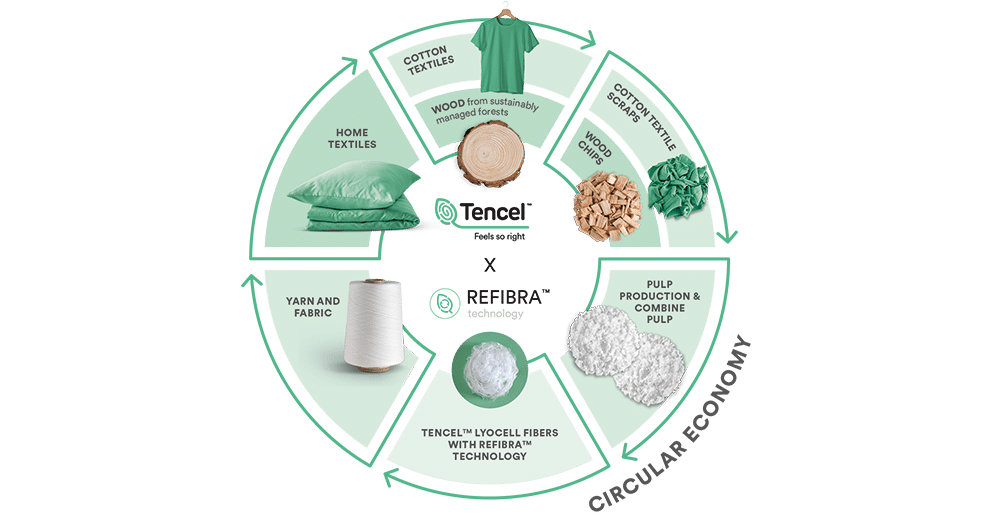
Closed-Loop Production Process
Tencel is a sustainable fabric because of its closed-loop process. This method reuses almost 99% of the solvents during production. Recycling these solvents reduces waste and chemical pollution. This makes Tencel’s production much better for the environment. Lenzing, the main maker of Tencel, has improved this process for over 20 years. They use renewable wood, like eucalyptus, from FSC or PEFC-certified forests. These certifications ensure the wood is sustainably sourced.
This process saves resources and improves fabric quality. Tencel fibers made this way are soft, strong, and eco-friendly. That’s why Tencel is popular for sustainable clothing and home items.
Low Resource Usage
Tencel uses fewer resources compared to other fabrics. For example, cotton needs over 20,000 liters of water per kilogram. Tencel production uses 10-20 times less water. Eucalyptus trees, used for Tencel, grow fast and need little water or pesticides. This makes Tencel a greener choice than traditional textiles.
The production process also saves energy, lowering its environmental impact. By using fewer resources, Tencel helps protect nature and ecosystems. Choosing Tencel means picking a fabric that saves resources while staying high-quality.
Environmental Benefits
Tencel has many environmental benefits, making it great for sustainable fashion. It’s biodegradable, so it breaks down naturally and reduces waste. Studies show Tencel has less global warming and water impact than other fabrics. Tencel products, like lyocell, last longer, giving you more value.
Unlike synthetic fabrics, Tencel doesn’t cause microplastic pollution. Its fibers stay strong and colorful after many washes, so you replace them less often. By choosing Tencel, you help reduce textile pollution and enjoy a premium, eco-friendly fabric.
Tip: Choose Tencel for a greener wardrobe and sustainable home items.
Comparing Tencel to Other Fabrics
Tencel vs. Cotton
Tencel and cotton differ in sustainability and performance. Tencel reuses 99% of its solvents during production. Cotton, however, needs a lot of water and pesticides. For example, making one kilogram of cotton uses over 20,000 liters of water. Tencel, by comparison, uses 10-20 times less water.
Tencel feels softer and smoother because of its fine fibers. Cotton is breathable but can feel rough after some time. Mixing tencel with cotton makes the fabric stronger and last longer. A blend of 67% cotton and 33% tencel shows similar strength to pure tencel.

If you want an eco-friendly and durable fabric, tencel is better than cotton.
Tencel vs. Rayon
Both tencel and rayon come from wood pulp, but tencel is greener. Rayon production uses harmful chemicals like carbon disulfide. These chemicals can hurt workers and pollute the environment. Tencel’s closed-loop process reduces waste and pollution.
Tencel is also stronger and lasts longer than rayon. It keeps its shape and resists tearing, even after many washes. Rayon weakens when wet, making it less reliable. If you need a fabric that’s sustainable and durable, tencel is the smarter choice.
Tencel vs. Polyester
Polyester is made from petroleum, while tencel comes from wood pulp. This difference affects their impact on the environment. Polyester relies on non-renewable resources and releases microplastics during washing. These microplastics harm oceans and wildlife. Tencel, being biodegradable, breaks down naturally without causing damage.
Tencel is more comfortable because it breathes well and wicks moisture. Polyester traps heat and sweat, making it uncomfortable in hot weather. Tencel also feels softer and smoother than polyester’s synthetic texture. For a fabric that’s eco-friendly and comfy, tencel is the clear winner.
Applications of Tencel Fabric

Tencel is a kind of fiber that can be woven or knitted to be more kinds of fabric for different applications.
Clothing and Apparel
Tencel fabric is loved in fashion for being soft and strong. It’s used in dresses, shirts, and workout clothes. Its ability to absorb moisture makes it great for sportswear. It keeps you cool and dry while exercising. Tencel’s smooth feel is gentle on sensitive skin, offering comfort without irritation.
Eco-friendly fashion brands like Tencel for its green production process. Many people choose Tencel clothes because they care about the planet. Big brands in the U.S., Europe, and Asia now use Tencel in their designs, showing its worldwide popularity.
Did you know? More people want eco-friendly fabrics like Tencel as sustainable fashion grows.
Bedding and Home Textiles
Tencel fabric is popular for bedding and home items. Tencel sheets are soft, durable, and luxurious. They let air flow, giving you a cool and comfy sleep. Unlike cotton sheets, Tencel sheets pull moisture away, keeping you dry on warm nights.
Tencel’s eco-friendly fibers make it a top choice for green homes. Its biodegradable nature helps reduce waste. From pillowcases to duvet covers, Tencel offers both comfort and sustainability.

Other Uses
Tencel fabric is also used in many other products. Outdoor brands use it in jackets and base layers. Its lightness and breathability make it perfect for outdoor gear. Companies like Avocado and Vaude use Tencel in pillows and sleeping bags, offering eco-friendly options.
Tencel is even used in industries like medicine and filters. Its strength and ability to break down naturally make it useful. These many uses show how Tencel can improve different industries.
Tip: Check for Tencel in unexpected items like outdoor gear or home goods to enjoy its benefits.
Caring for Tencel Fabric
Washing and Drying
Taking care of Tencel fabric is simple and ensures it lasts longer. Always check the care label on your Tencel items before washing. Most Tencel fabrics can be machine-washed, but using a gentle cycle is best. Cold water works well to maintain the fabric’s softness and prevent shrinkage.
Use a mild detergent to clean your Tencel items. Harsh chemicals can damage the fibers. Avoid bleach, as it weakens the material and affects its eco-friendly properties. If you prefer hand washing, soak the fabric in cold water for a few minutes, then gently rub and rinse.
When drying, avoid high heat. Tencel dries quickly, so air drying is ideal. Lay the fabric flat or hang it on a line to prevent wrinkles. If you use a dryer, choose a low-heat setting. Overheating can shrink or weaken the fibers.
Tip: To keep your Tencel items looking new, wash them with similar colors and avoid overloading the machine.
Ironing and Storage
Tencel fabric resists wrinkles, but light ironing can help if needed. Use a low heat setting on your iron to avoid scorching the fibers. Placing a thin cloth between the iron and the fabric adds extra protection. Steam ironing works well for removing stubborn wrinkles without direct contact.
Store your Tencel items in a cool, dry place. Fold them neatly to avoid creases. If you prefer hanging, use padded hangers to maintain the shape of your clothes. Keep Tencel bedding in breathable storage bags to protect it from dust.
Note: Proper care not only extends the life of your Tencel items but also keeps them soft and comfortable for years.
Tencel fabric is soft, strong, and good for the planet. It’s made in a way that harms the environment less. This makes it a top choice for eco-friendly fabrics. Tencel feels smooth and lasts a long time, perfect for clothes or home items. Picking Tencel helps the Earth while keeping style and comfort. Try Tencel today for a smart and green choice for your home and wardrobe.
FAQ
Why is Tencel fabric eco-friendly?
Tencel fabric is made using a closed-loop process. This process reuses 99% of the solvents, reducing waste. It also uses less water and energy than cotton. The wood pulp comes from forests managed sustainably. Tencel’s biodegradable nature helps cut down on waste.
Tip: By choosing Tencel, you support eco-friendly and green practices.
Does Tencel shrink after washing?
Tencel doesn’t shrink if washed the right way. Use cold water and a gentle cycle to keep its shape. Avoid high heat when drying, as it may cause slight shrinking. Always check the care label for proper washing instructions.
Note: Air drying is the best way to keep Tencel in good condition.
Is Tencel good for sensitive skin?
Yes, Tencel is great for sensitive skin. Its fibers are soft and smooth, preventing irritation. It also absorbs moisture, keeping your skin dry and comfy. Tencel is hypoallergenic, making it a good choice for people with allergies.
Did you know? Tencel feels softer than cotton, making it perfect for delicate skin.
How is Tencel better than synthetic fabrics?
Tencel breathes better and wicks moisture faster than synthetics like polyester. It feels softer and doesn’t trap heat, making it more comfortable. Unlike synthetic fabrics, Tencel is biodegradable and doesn’t release microplastics into water.
Emoji Tip: Pick Tencel for a greener and comfier fabric option.
Can Tencel mix with other materials?
Yes, Tencel blends well with cotton, wool, or polyester. Blending makes the fabric stronger and adds special features. For example, a Tencel-cotton blend is soft and durable, perfect for daily use.
Pro Tip: Try Tencel blends for the best mix of comfort and strength.

